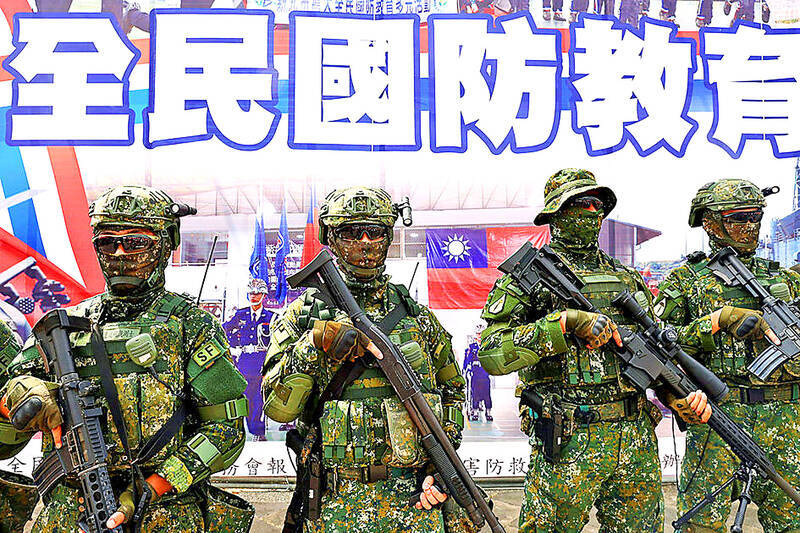The government has unveiled a preview of proposed amendments to rules governing alternative civilian service to bolster the civil defense system.
The Executive Yuan in December 2022 incorporated demobilized alternative civilian service members into the civil defense program by allowing the government to recall men demobilized within the previous eight years to train one day per year.
The amendments would authorize the government to recall former civilian service members to train or serve for longer periods and more often than regulations initially stipulated, the Ministry of the Interior said in a notice posted earlier in the week.

Photo: Ann Wang, Reuters
The government may invoke this power to deal with extreme weather events, geopolitical tensions, natural disasters or to support military operations, the ministry said.
The changes would allow officials to recall former civilian service members dismissed between one and nine years earlier to train in civil defense-related tasks and capabilities, it said.
The proposed regulations require central and local government agencies to request the recall of former civil service members 10 days ahead of time, from the 20 days previously stipulated, the ministry said.
The amendments would also enable the government to call up 50 percent of the total number of civilian service reservists, up from the current 20 percent limit, it said.
The five-day limit on the term of service is to be abolished, it said.
Summonses to serve must reach civilian service members two days before the targeted training event, it said.
Injured or ill service members or those in bereavement, certain family emergencies, or subject to a force or circumstance beyond their control would be exempt from the summons, the ministry said.
The government aims to draft 13,650 men into civilian alternative service this year, an official speaking on condition of anonymity said yesterday.
The government would from next month start accepting applications for would-be military conscripts to apply for alternative service, they said.
The government had hoped to recall 72,000 former civilian alternative service personnel to train in national emergency response this year, but the target was reduced to 50,000 following budget cuts, the source said.
The government last year recalled 50,052 dismissed civilian service members to train for national emergency response, they added.
The government would recall 120 active and reserve civilian service members to participate in the nation’s first Whole-of-Society Defense Resilience Field Exercise in Tainan on Thursday, the official said.

SECURITY: As China is ‘reshaping’ Hong Kong’s population, Taiwan must raise the eligibility threshold for applications from Hong Kongers, Chiu Chui-cheng said When Hong Kong and Macau citizens apply for residency in Taiwan, it would be under a new category that includes a “national security observation period,” Mainland Affairs Council (MAC) Minister Chiu Chui-cheng (邱垂正) said yesterday. President William Lai (賴清德) on March 13 announced 17 strategies to counter China’s aggression toward Taiwan, including incorporating national security considerations into the review process for residency applications from Hong Kong and Macau citizens. The situation in Hong Kong is constantly changing, Chiu said to media yesterday on the sidelines of the Taipei Technology Run hosted by the Taipei Neihu Technology Park Development Association. With

A US Marine Corps regiment equipped with Naval Strike Missiles (NSM) is set to participate in the upcoming Balikatan 25 exercise in the Luzon Strait, marking the system’s first-ever deployment in the Philippines. US and Philippine officials have separately confirmed that the Navy Marine Expeditionary Ship Interdiction System (NMESIS) — the mobile launch platform for the Naval Strike Missile — would take part in the joint exercise. The missiles are being deployed to “a strategic first island chain chokepoint” in the waters between Taiwan proper and the Philippines, US-based Naval News reported. “The Luzon Strait and Bashi Channel represent a critical access

‘FORM OF PROTEST’: The German Institute Taipei said it was ‘shocked’ to see Nazi symbolism used in connection with political aims as it condemned the incident Sung Chien-liang (宋建樑), who led efforts to recall Democratic Progressive Party (DPP) Legislator Lee Kun-cheng (李坤城), was released on bail of NT$80,000 yesterday amid an outcry over a Nazi armband he wore to questioning the night before. Sung arrived at the New Taipei City District Prosecutors’ Office for questioning in a recall petition forgery case on Tuesday night wearing a red armband bearing a swastika, carrying a copy of Adolf Hitler’s Mein Kampf and giving a Nazi salute. Sung left the building at 1:15am without the armband and apparently covering the book with a coat. This is a serious international scandal and Chinese

COUNTERINTELLIGENCE TRAINING: The ministry said 87.5 percent of the apprehended Chinese agents were reported by service members they tried to lure into becoming spies Taiwanese organized crime, illegal money lenders, temples and civic groups are complicit in Beijing’s infiltration of the armed forces, the Ministry of National Defense (MND) said in a report yesterday. Retired service members who had been turned to Beijing’s cause mainly relied on those channels to infiltrate the Taiwanese military, according to the report to be submitted to lawmakers ahead of tomorrow’s hearing on Chinese espionage in the military. Chinese intelligence typically used blackmail, Internet-based communications, bribery or debts to loan sharks to leverage active service personnel to do its bidding, it said. China’s main goals are to collect intelligence, and develop a